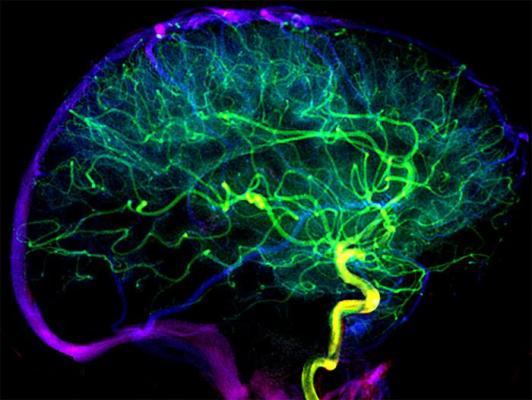
Visualization of the blood vessels in the brain of a patient without early venous filling, meaning without excessive reperfusion of the brain area after removal of the blood clot in the blocked artery. Image courtesy of P. Thurner und Z. Kulcsar, University Hospital Zurich
February 26, 2024 — Ischemic strokes are a major health burden. They occur when a blood vessel that supplies the brain becomes blocked, impairing blood flow to the brain. As a result, brain tissue suffers from a lack of oxygen and nutrients, which causes symptoms such as paralysis, confusion, dizziness, headache, trouble speaking or even death.
Many stroke patients recover poorly despite timely treatment
To treat these symptoms and restore blood flow to the brain, the obstructed vessel needs to be “declogged”, or recanalized. Contemporary treatments to remove the clot include intravenous thrombolysis or mechanical thrombectomy using a catheter. However, even with timely clot removal, many stroke patients only recover poorly.
The research group of Susanne Wegener, professor at the University of Zurich (UZH) and senior leading physician at the Department of Neurology of the University Hospital Zurich (USZ), has now demonstrated that the outcome of stroke treatments depends on the collateral network. Collaterals are blood vessels that cross-connect adjacent arterial trees, providing potential detour networks in case of a vascular blockage. “These vascular bridges maintain cerebral autoregulation and allow for a slower, gradual reperfusion, which results in smaller infarcts,” says Wegener.
Rapid reperfusion increases mortality
For their study, the research team with the two co-first authors Nadine Binder and Mohamad El Amki used a mouse model of stroke as well as advanced in vivo imaging methods to investigate changes in the arterial blood supply. In mice with poor collaterals, the arterial segments were dysfunctional and rigid after clot removal. “The rapid reperfusion that followed caused brain hemorrhage and increased mortality,” says Wegener.
The researchers were then able to confirm the results obtained in the mouse model in stroke patients. Stroke patients who had poor collaterals showed a similar rapid reperfusion following treatment to remove blood clots, also resulting in small cerebral hemorrhages and unfavorable recovery.
The better the arterial connections, the better the recovery
So far, the focus has been on quick removal of blood clots in stroke patients, while problems associated with rapid post-treatment reperfusion and its potential harmful effects had received little attention. The study now implies that it is possible to identify stroke patients with a higher risk of poor recovery by the speed of reperfusion during treatment. “Future therapeutic interventions for stroke should aim to enhance collateral function, allowing for beneficial reperfusion after stroke,” concludes Susanne Wegener.
For more information: https://www.uzh.ch/en.html


 January 05, 2026
January 05, 2026 









